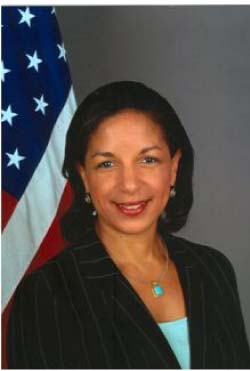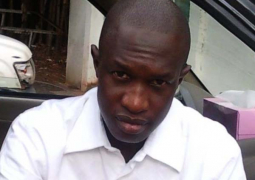
Good morning everyone, and welcome to the United Nations. Usually, when I look around this room, I see faces and heads that are a whole lot grayer than yours. So it’s nice to see you and young people here at the United Nations. And I like the look of what I see in this room.
In my job, believe it or not, there are many times when I think about you. At times when negotiations get tough and things get especially frustrating, I think about the next generation. I think about my own kids, and young people like you who are depending on strong leadership and wise policies to keep you safe. And I remember that it’s your future that my colleagues and I are fighting for. You give me strength, you give us all inspiration, and you make us all very proud.
Last December, when the United States last held the presidency of the United Nations Security Council, we held a special event to bring greater attention to the concerns of young people around the world. We showed the Security Council video clips produced and submitted by young people like you. We put out the call for submissions all over the world, and then we watched in amazement as some 1,000 of them rolled in from over 90 countries. These young people spoke passionately about their primary fears and concerns. They spoke about what they saw as threats to international peace and security—from religious extremism, corruption and crushing poverty to cyber-terrorism and climate change.
We learned, as we might have expected, that young people long for peace. We learned that they want to be protected from war and bloodshed. That you worry about the underlying conditions that could ignite conflict. And that young people see a very clear link between security and underdevelopment. And that the Millennium Development Goals, in many ways, are in fact your goals.
We hear you loud and clear. And we need you to work with us to address the challenges that we face today as well as the challenges that you will face tomorrow. Our common problems require common solutions. In our interconnected world, our fates are bound together. That means that positive change can spread with amazing speed, as we’ve seen in the Middle East. But it also means that we face new threats that pay no heed to borders—threats such as nuclear proliferation, pandemic disease, genocide, cyber attacks, and more.
When a country far away is caught up in conflict or can’t meet the basic needs of its people, it can become an incubator for the new threats that we’ve just discussed, including terrorism and criminal networks. So we simply cannot afford to worry only about our own security and prosperity within the narrow confines of our national borders and ignore the cries of people suffering from conflict or desperate poverty elsewhere in the world.
And that’s why the work we do here at the United Nations is so important to the world that you all will inherit. At the United Nations, 193 countries can come together to share the cost and the responsibilities of providing stability, assistance and hope in the world’s most broken places. The UN lets us all share the burdens of tackling global challenges. It prevents conflict and helps keep nations from slipping back into war through peacekeeping missions, mediation, and peacebuilding efforts to help rebuild shattered societies. The UN helps halt the spread of weapons of mass destruction, including nuclear weapons, it helps also by imposing tough sanctions in places where they are merited. UN humanitarian agencies go often where no one else will go to provide lifesaving food, water, and medicine to the most vulnerable and the most desperate—whether in Somalia or in Pakistan after the floods or in Haiti after the earthquake. And the United Nations promotes core values that Americans and people around the world hold dear, including democracy, development, and equality. And we do that, whether by trying to spotlight human rights abuses in places like Cote d’Ivoire and Burma, and, as we are debating today, in Syria, or by offering support to the emerging governments in places like Tunisia and Egypt.
Now, we all know that for all the good the United Nations can and must do, it is far from perfect. It needs to enforce greater budget discipline and become more accountable and cost-effective. It has to do more to cut bureaucracy and reward talent. And so we’re leading the charge for serious and sustained reform here. But we’re also always conscious of the many, many benefits that the United Nations provides to every American and to every citizen of the world.
As Americans, we’re constantly striving to build a more perfect union. We haven’t always lived up to our founding promise of liberty and equal rights under the law for all. But in every age, Americans have tried to make that promise real. And from generation to generation, at times of struggle and strife, our young people have seen us through. They have lifted our sights and powered our movements for change.
And so now it’s your turn. It’s your time. And we need all of your energy, your passion, and your courage. We need you to dream and to plan. We need you to do big things. And we need each of you to perform to your fullest potential. You all are growing up in amazing times, and we, in this country and every country around the world, cannot spare a single one of you. We need each one of you engaged.
And that’s why I’m so proud and excited to see you all here today. We need young people of every country, every race, every religion, creed and color preparing to chart our course forward together. So please stay with what you’re doing, please think seriously about committing to a life in public service and to making this world a more just, decent and peaceful place.
Above all, be fearless. Get the very best education that you possibly can. Stretch yourself and get out of your comfort zone. Go travel the world. Learn as many other languages as you can. And get service in your soul, and go make us proud.
Thank you very much, and have a great day.
Read Other Articles In Article (Archive)



